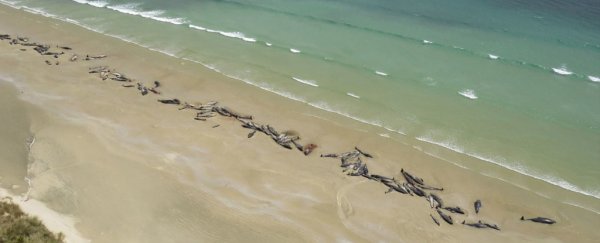Scientists have an imprecise understanding of the obscure phenomenon of mass whale strandings, when large numbers of the marine mammals suddenly beach themselves - often their final acts.
There are, of course, many reasons a whale would find itself on a beach: illness or injury that leaves them at the mercy of ocean currents and strong waves; a sudden dart into shallow water to escape a predator or pursue prey; even echolocation errors or confusion over quickly falling tides, which can doom them.
But such strandings are mostly solo occurrences; they usually do not involve scores of whales.
A hiker's grim discovery in New Zealand's Mason Bay over the weekend remains a heartbreaking mystery.
There, lying in a jagged line on the remote beach, were more than 140 immobile animals: two full pods of pilot whales, dead or dying in the sun.
Because of the remote location - Mason Bay is on New Zealand's southernmost island, which has a population of fewer than 400 - authorities said they weren't able to gather enough people to help the whales get back into the Pacific Ocean in time.
That left just one option: help the whales die.
"Sadly, the likelihood of being able to successfully re-float the remaining whales was extremely low," Ren Leppens, the Rakiura operations manager for the New Zealand Department of Conservation, said in a statement.
Half the animals were already dead when conservationists arrived, he said.
"The remote location, lack of nearby personnel and the whales' deteriorating condition meant the most humane thing to do was to euthanise," Leppens added. "However, it's always a heart-breaking decision to make."
Refloating whales and dolphins can take many labor-intensive hours, an abundance of trained personnel and, in some cases, special equipment. Experts recommend at least one person per animal just to soothe a beached creature; even then, it's a dangerous undertaking.
"Whales can become agitated when stressed and can injure or even kill a human with a small flick of a whale fin or tail," according to New Zealand's Department of Conservation.
"They also carry diseases so people need to avoid contact with blowhole exhalant or body fluids."
With the heart-rending decision to euthanize, the Mason Bay operation morphed from rescue to cleanup.
Pilot whales can grow 5.7 metres (19 feet) long and weigh more than 2.7 tonnes (3 tons), a massive amount of decaying flesh.
And decomposing whales present a unique kind of hazard, as gases build up inside the large mammals, according to National Geographic, turning majestic sea creatures into a sudden explosion danger.
Conservation authorities placed a "rāhui," or restriction, over the beach, according to the New Zealand Herald.
The restriction, which has roots in Maori culture, was made to "deter people from going near the whales as they decompose, primarily for their own safety," according to the conservation department.
The agency said the restriction would remain in place as officials consider their next step.
The stranding was New Zealand's largest since several hundred pilot whales were found last year in a place called Farewell Spit; many of them were already dead, according to the Department of Conservation.
In that incident, authorities said, hundreds of pilot whales swam into a shallow bay, then got stuck in the waterway, ultimately beaching themselves. It was one of the worst mass beachings in the country's history, despite desperate attempts to save the animals.
Photos published by New York Times last year showed more than 500 volunteers draping towels over the marine mammals and pouring buckets of seawater on them before they could be refloated.
Some made it back into the water, but others beached themselves again shortly after, the Times reported.
The most recent mass stranding came a century after the largest reported whale stranding on record, also in New Zealand, according to CNN. In 1918, about 1,000 whales stranded themselves on the Chatham Islands.
Since 1840, there have been more than 5,000 incidents of marine mammal strandings in New Zealand, so many that the Department of Conservation has a special hotline to report them.
2018 © The Washington Post
This article was originally published by The Washington Post.
